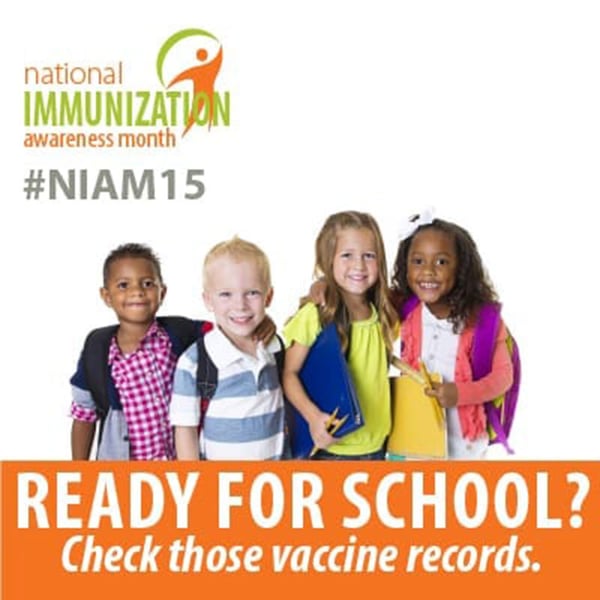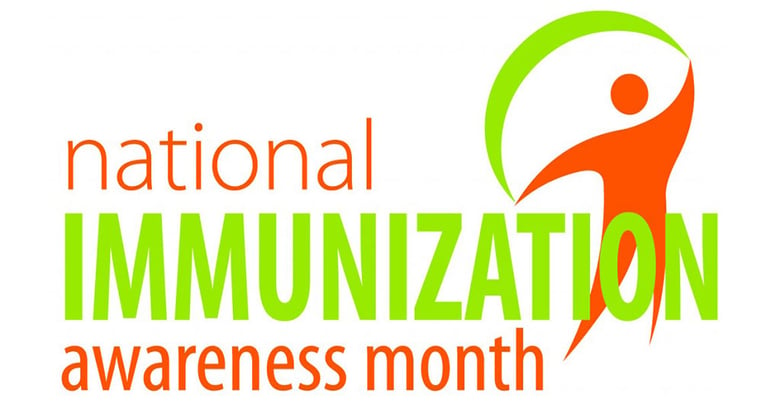
BACK-TO-SCHOOL: Time to make sure all your kids, even college-bound young adults, have all the required vaccinations. Image: NPHIC
As August winds down and fall approaches, the UMHS Endeavour reminds you that we all need vaccines throughout our lives
This is the final installment in a month-long series in the UMHS Endeavour about immunization for people at various stages in life. This week, we focus on immunization for children going back to school and the need to check kids’ vaccine records (yes, even college-bound young adults).
The UMHS Endeavour is publishing this guest post from the National Public Health Information Coalition (NPHIC) to inform the public and students at American and Caribbean medical schools why children of all ages must get vaccinated to protect themselves from preventable diseases.
Check Your Kids' Vaccine Records
By the National Public Health Information Coalition
It’s back-to-school time. Follow the immunization schedule recommended by your local school and family doctor to provide your children with the best protection, and keep your children’s vaccine records current.
Following are some facts about vaccination for children.
- Between the time your child is born and when they go off to college, they’ll get vaccines to protect against a number of serious diseases.
- Make sure that you provide your child care facility with updated vaccine records each time you visit the doctor to get another important dose of a vaccine.
- Some children at your child care center may be too young for certain vaccines, and are therefore vulnerable to diseases. By keeping your children up to date on vaccines, you’ll be protecting their younger classmates as well. You will also be helping to protect people in your community with weakened immune systems, such as some people with cancer and transplant recipients, who are also at higher risk of disease.
Vaccination for Preteens & Teens
Preteens and teens are at risk for diseases like meningitis and HPV cancers and need the protection of vaccines to keep them healthy and in school.
Vaccines are recommended for preteens and teens because:
Some of the childhood vaccines wear off over time, so adolescents need shots to stay protected from serious diseases like tetanus, diphtheria, and pertussis (whooping cough).
As children get older, they are at greater risk of getting certain diseases like meningitis, septicemia, and HPV-related cancers.
Specific vaccines, like HPV, should be given during the preteen (11 to 12) years because they work better at that age.
Vaccines not only protect your preteens and teens from serious diseases. They also protect siblings, friends and the people who care for them, like parents or grandparents.
Even healthy college students can get sick from vaccine-preventable diseases. Protection from vaccines received during childhood can wear off with time, and college students may also be at risk for other vaccine-preventable diseases like meningitis.
Many vaccine-preventable diseases can easily spread in child care and school settings.
Schools are a prime venue for transmitting vaccine-preventable diseases, and school-age children can further spread disease to their families and others with whom they come in contact. For example, they can spread disease to vulnerable newborns too young to have received the maximum protection from the recommended doses of vaccines, or people with weakened immune systems, such as some people with cancer and transplant recipients who are also at higher risk of disease.
Why Measles Vaccine Is So Important
From January 1 to June 26, 2015, 178 people in the United States have been reported to have measles. Measles is very contagious. It can spread through the air when people with measles cough or sneeze. It is so contagious that if one person has it, nine out of 10 people around him or her will also become infected if they are not protected. An infected person can spread measles to others even before knowing he or she has measles– up to four days before the telltale measles rash appears.
Vaccines are among the safest and most cost-effective ways to prevent disease. Protecting your children from preventable diseases ill help keep them healthy and in school.
Check Your Child’s Immunization Records
- When a child comes down with a disease such as whooping cough, chickenpox or the flu, he or she may miss a lot of school while recovering – and somebody will need to stay home to provide care and make trips to the doctor.
- If you haven’t already, check your child’s immunization record and schedule a visit to their physician or clinic. Doing so now will avoid a potential last minute rush and will help make sure there are no surprises on the first day of school.
- Most schools require children to be up to date on vaccinations before enrolling or starting school in order to protect the health of all students. If you are unsure of your state’s school immunization requirements, check with your child’s doctor, school, child care provider, college health center, or local health department.
College-Bound Young Adults Need Vaccines, Too
Vaccines are recommended throughout our lives. Young adults need vaccines too, especially when they are college bound.
Consider the following:
- The need for vaccination does not end in childhood. Vaccines are recommended throughout our lives based on age, lifestyle, occupation, travel locations, medical conditions, and previous vaccination history.
- Even healthy young adults can get sick from vaccine-preventable diseases. Protection from vaccines you received during childhood can wear off with time, and you may also be at risk for other vaccine-preventable diseases.
- You can send your kids off to college protected from serious diseases by making sure they’ve received all the vaccines recommended for them. Far too few adults are receiving the recommended vaccines, leaving themselves and their loved ones unnecessarily vulnerable to serious diseases.
- Talk to your child’s doctor or other health care professional to make sure your children get the vaccinations they need when they need them.
- Take advantage of any visit to the doctor – checkups, sick visits, even physicals for sports or college – to ask the doctor about what vaccinations your child needs.
Families who need help paying for childhood vaccines should ask their health care provider about the Vaccines for Children program, which provides vaccines at no cost to eligible children who do not otherwise have access to immunization.
For more information, please visit http://www.cdc.gov/vaccines/schedules/index.html

Infographic: CDC
(Top image). Image: Courtesy of NPHIC
About UMHS:
Built in the tradition of the best US universities, the University of Medicine and Health Sciencesfocuses on individual student attention, maintaining small class sizes and recruiting high-quality faculty. We call this unique approach, “personalized medical education,” and it’s what has led to our unprecedented 96% student retention rate, and outstanding residency placements across the US and Canada. UMHS is challenging everything you thought you knew about Caribbean medical schools.

Scott is Director of Digital Content & Alumni Communications Liaison at UMHS and editor of the UMHS Endeavour blog. When he's not writing about UMHS students, faculty, events, public health, alumni and UMHS research, he writes and edits Broadway theater reviews for a website he publishes in New York City, StageZine.com.















